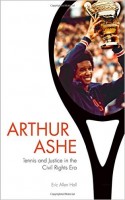 Author: Eric Allen Hall; Jacket Design: J. Spence Holman; Author Photo: Christina Abreau
Author: Eric Allen Hall; Jacket Design: J. Spence Holman; Author Photo: Christina Abreau
Publisher: Johns Hopkins University Press – 331 pages
Book Review by: Paiso Jamakar
Arthur Robert Ashe Jr., born on July 10, 1943, was an African-American professional tennis player who won three Grand Slam titles, ranking him among the best tennis players from the United States. He was also the first black player selected for the United States Davis Cup team, and the only black man to win the singles title at Wimbledon, U.S. Open, or Australian Open.
He was ranked the top tennis player in the world by Harry Hopman, the world-acclaimed Australian tennis player, in 1968, and by Lance Tingay of the London Daily Telegraph and by Tennis Magazine in 1975. He retired from tennis in 1980.
In the 1980s Arthur Ashe contracted HIV from a blood transfusion he received during heart bypass surgery. He publicly announced his illness in 1992, and began to educate others about HIV and AIDS. He died from AIDS-related pneumonia on February 6, 1993 at age 49. On June 20, 1993, Ashe was posthumously awarded the Presidential Medal of Freedom by then U.S. President Bill Clinton.
This book by Eric Allen Hall examines the highlights of the life of Arthur Ashe. We provide below for you an overview of the major events of his life:
Introduction
- Richmond
- UCLA
- An Emerging Activist
- Bright Lights and Civil Rights
- Tennis Wars
- Defeat and Victory in South Africa
- Transitions
- The Comeback
- Triumph and Tragedy
Conclusion
Notes
Essay on Sources
Among the main areas of focus and involvement of the tennis ace during his lifetime, the author, writing in carefully-chosen words, narrates in this book how Arthur Ashe:
- Overcame racial and class barriers to reach the pinnacle of tennis world
- Evolved as an activist who contended with the shift from civil rights to Black Power
- Positioned himself at the center of the black freedom movement
- Negotiated the poles of black nationalism and assimilation into white society
- Navigated the thin lines between conservatives and liberals, reactionaries and radicals, the sports establishment and the black cause
- Struggled against adversity
- Balanced his stance between the comforts of tennis–star status and his felt obligation to protest against discriminatory barriers whites put up to keep blacks “in their place.”
- Lived a peculiarly difficult moral life, with the personal and political producing conflict
- Was criticized by whites for being ungrateful; and by blacks for not being radical enough
- Broke radical taboos for playing tennis in Dixie and in South Africa
- Authored A Hard Road to Glory, the first published synthesis of black sports history
- Publicly acknowledged that he was ill with AIDS (despite the stigma attached to it) having become infected with the HIV virus from a blood transfusion following a coronary bypass surgery in 1983
Author:
Eric Allen Hall is an assistant professor in the history department at Georgia Southern University in Statesboro.







